Welcome to another issue of The Newport Cornucopia where we dig through the newspapers archives for interesting news articles and adverts. All articles are posted verbatim and most headlines are original (headlines in quotes are my own).

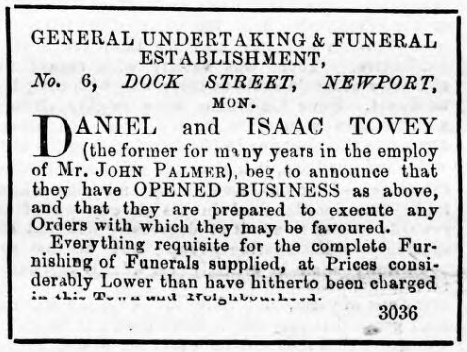
Lyceum Theatre Introduces Queuing
An advert published in the South Wales Argus on Saturday 6th September, 1902 (Subscription required) features a notice informing the public of the introduction of a "queue" whereby customers will be required to line two-by-two.
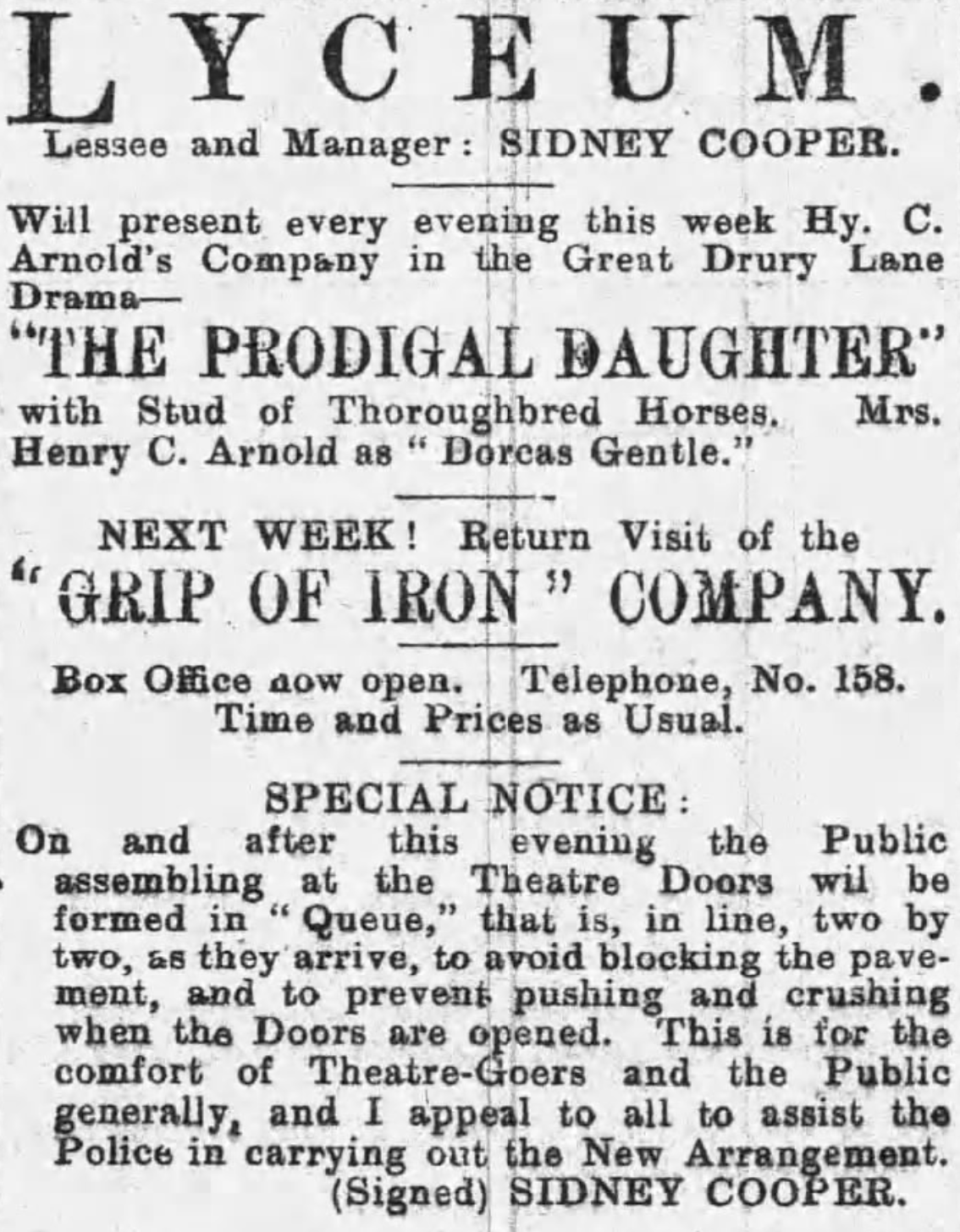
The Carpenters' Arms Lane and its Posts
After a long and animated conversation upon this oft-discussed subject, it was, after formal resolution had been rescinded, resolved, upon the motion of Alderman Davis, seconded by Mr Moses:-
" That the post at the southern end of Carpenters' Arms Lane be removed, and a movable post be substituted, secured by lock and key, and that Mr Eldershaw be allowed to take carts to and from his premises for his own private use before nine o'clock in the morning on payment of an acknowledgement of 1s per annum, subject, nevertheless, to the liberty being withdrawn at the pleasure of the Board. Mr Eldershaw to enter into a proper agreement to this effect, and to alter the large doors into sliding doors."
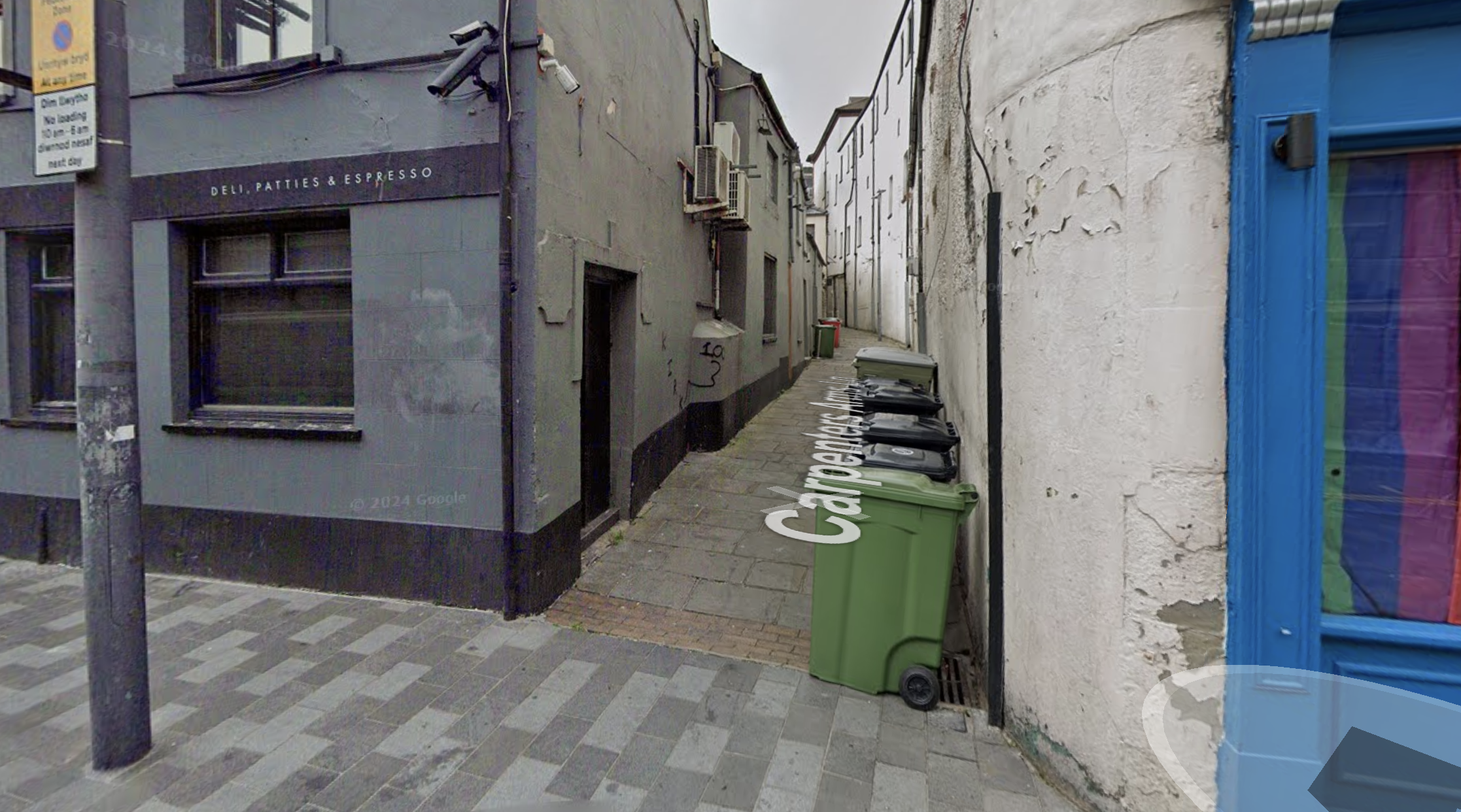
— Monmouthshire Merlin, Saturday 18th August, 1866

The Stench-Funnel on Stow-Hill
The following minute passed by the Board of Guardians and forwarded to the Town Clerk, by Mr. W. D. Evans, was then read by the Mayor:—
Union Workhouse, Newport, 18th Aug., 1866. The relieving officers, Mr. Salter and Mr. Evans, complained to the Board that the fumes from the iron stack, erected by the Newport Board of Health, on Stow Hill, have been perceived by Mr. Evans in his own house, and Mr. Salter and the nurse in the hospital. The Guardians consulted their medical officers on the subject, and find it to be their opinion that, as the stack in question does not carry off the deleterious gases which escape there-from, they will prove highly injurious to the health of the inhabitants of the neighbourhood.
(A Copy) W. DOWNING EVANS, Clerk.
Alderman Davis said he thought it right he should name that he was told on Sunday by some ladies who were at his house, that they had experienced a very disagreeable smell indeed from the stack as they passed over the hill by the Church. He was told the same thing by a gentleman; and he understood that Mr. Robert Woollett had expressed a strong opinion that the stack was likely to prove detrimental to the health of the inhabitants, and more especially as it was placed contiguous to the fever hospital, the whole of the refuse from which passed into the sewer just below it; as he understood, Mr. Woollett said it could not be put in a worse place.
Mr. Batchelor: It is a serious position if that be so.
Alderman Townsend said common sense would have told them at once what must be the effect, if they had considered it beforehand.
Alderman Davis: It is only right that I should say that Mr. Lyne stated at the Dispensary meeting yesterday, that he had passed it with Mr. Rawlinson, a gentleman from the Crimea; and that Mr. Rawlinson said he did not think it likely it would be detrimental to health. But I suppose he did not know all the particulars; it was simply a passing comment as he passed by.
Mr. Brown: It is a little singular, you know, that this complaint should come from the two officers of the Board of Guardians.
Alderman Davis: They live close by—no wonder at all!
Mr. Brown: Thank you, Mr. Davis—much obliged for the information they do live there. The fact is this—the wind has been blowing over Mr. Evans's house—in that direction—the whole of the time the stack has been up.
Alderman Davis: No, no.
Mr. Brown appealed to the nautical men of the town to bear him out. And it was a strange thing that at the very moment the wind was carrying the fumes over Mr. Evans's house on one side, it was also carrying them into the fever hospital on the other side-splitting, in fact, right and left. He pointed that out to show the utter inconsistency of the complaint of these two men. Now, Mr. Salter had a keen nose-there was no doubt about that at all. But—it was an extraordinary thing—only at the end of July—last month—the Inspector of Nuisances went round and discovered two masses of filth, and volumes of smell and fumes emanating from three open privies, with a large cesspool 41 feet or 5 feet square, on the "Old Barn" premises, which the Guardians were called upon to remove. Now, it was an extraordinary thing that that nuisance should have existed for years and Mr. Salter not have discovered anything offensive there, and yet the moment this chimney was erected to carry the fumes above the houses, he should smell it most clearly. But there was this again with regard to the stack. Here they had the Town Surveyor saying, "It's of no use at all—it will not do what Mr. Brown says it will do and here we have Mr. Evans and Mr. Salter, and these ladies that Mr. Davis has referred to, saying, Yes, it does it acts most powerfully, and the fumes and smells of the town come up in large volumes." But strange to say all the rest of the inhabitants are silent.
Alderman Davis: No—query; I have heard it from dozens.
Alderman Townsend: From hundreds. Mr. Brown Have you smelled it yourself?
Alderman Davis: No I have not passed by.
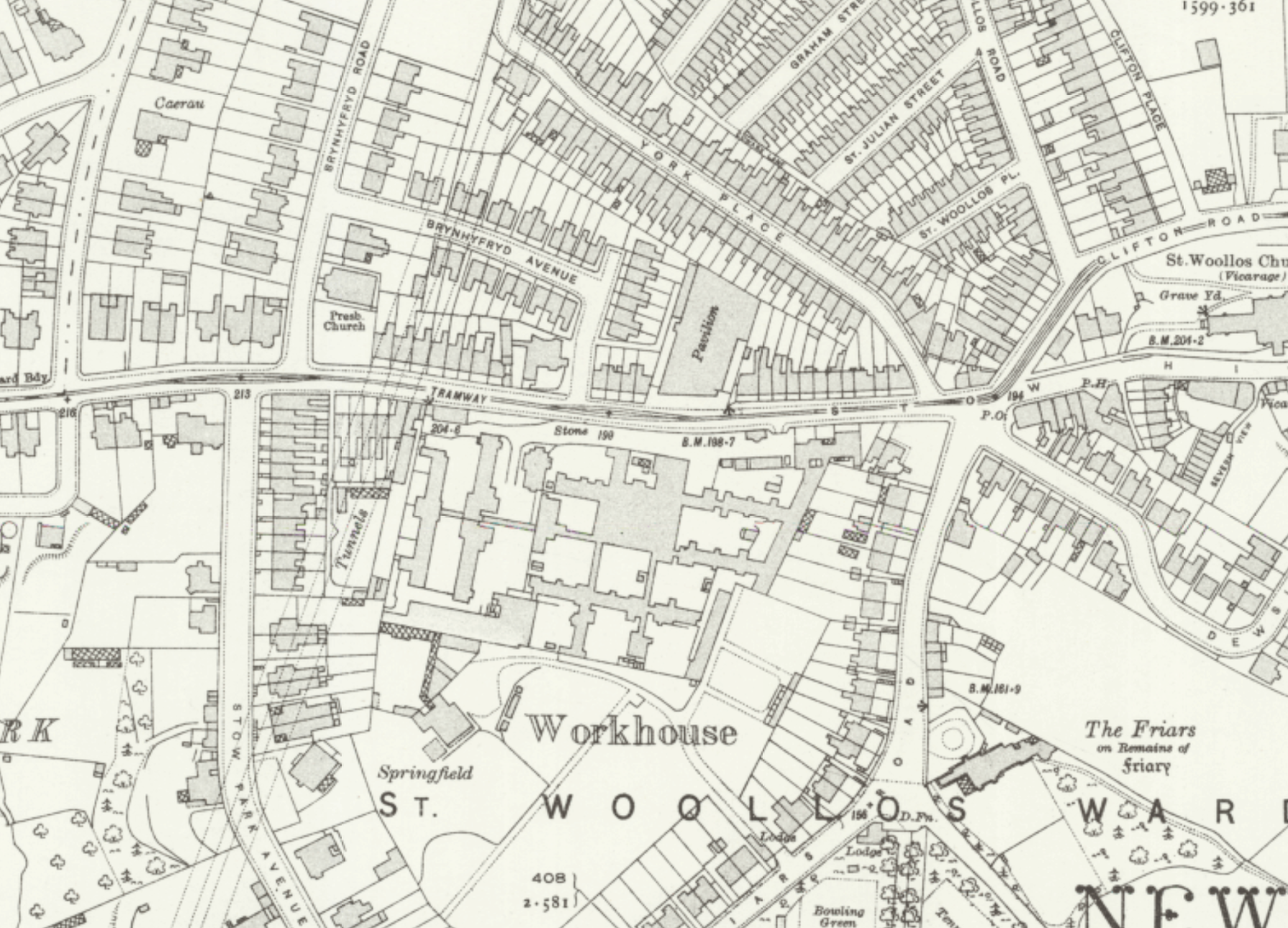
Mr. Brown: To be a little serious about the matter-—if it were a fact that offensive fumes passed out at the top of this funnel he was very glad to find it was so because it established the principle he had laid down at that Board, that that was the substantial effect of it; and for the purification of the town they should erect a higher stack, and one larger in diameter, and take the fumes and discharge them in the air, whence it would be impossible for them to return or fall down. But he himself thought this Board should have submitted to them by the Board of Guardians, as they had been kind enough to take the matter in hand, a certificate or report from some scientific man before they removed an important experiment which was for the health and comfort and benefit of the inhabitants of the town generally.
Mr. Bolt thought that all approaches to the town should be as wide as possible but this stack was placed in a narrow, and as he considered it, altogether the wrong place.
Mr. Moses: We, not the Guardians, are the Board of Health, and we are anxious nothing should be done to injure the health of one portion of the community for the good of the other. If there is anything really deleterious in this stack it is, therefore, our duty to test it, and to remedy the evil if there be any.
The Mayor: It would be our duty to remove it immediately.
Mr. Moses hoped they would not wait till two or three persons had been taken off by cholera. It was the duty of this Board to test the stack, and see if there really was anything deleterious.
Alderman Davis remarked that since the stack had been erected, they had had fine weather, and while that was the case there might not be much harm done by the stack but they might depend on it, if they got a dense foggy atmosphere all the effluvia would be flung downwards.
Mr. Brown observed that whereas during the prevalency of east winds the bouses on the upper side of Victoria-place, were usually very offensive, during the recent easterly wind they had been quite clear.
Mr. Moses inquired of the Town Surveyor if it were true, as reported, that they had had a similar stack at Llanelly, but that it had been taken down because it was found to be injurious to the health of the inhabitants.
The Town Surveyor was not aware. He had not even seen the report in the papers; but it bad been a subject of talk that such was the fact.
Some further desultory conversation ensued, and ultimately, on the suggestion of Mr. Moses, the Town Clerk was instructed to acknowledge the receipt of the minute, and to state that the Board had erected the stack simply because of their anxiety to promote the public health, and if it were found to be deleterious it would be taken down. Mr. Brown said they might give the stack a trial for another fortnight. If he thought it was a nuisance he would go for taking it down instantly. It was then understood that the medical officer (Dr. Davies) would examine the stack, and report concerning it at the next meeting.
—Monmouthshire Merlin, Saturday 25th August, 1866

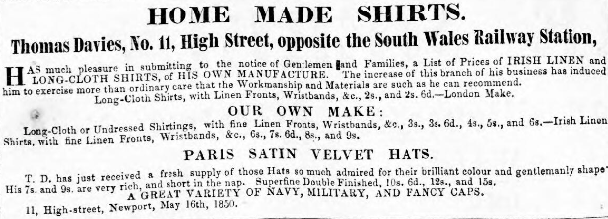
Permane's Bears
It's always interesting seeing the theatre line-ups in the early editions of the South Wales Argus and trying to research who the performers were.
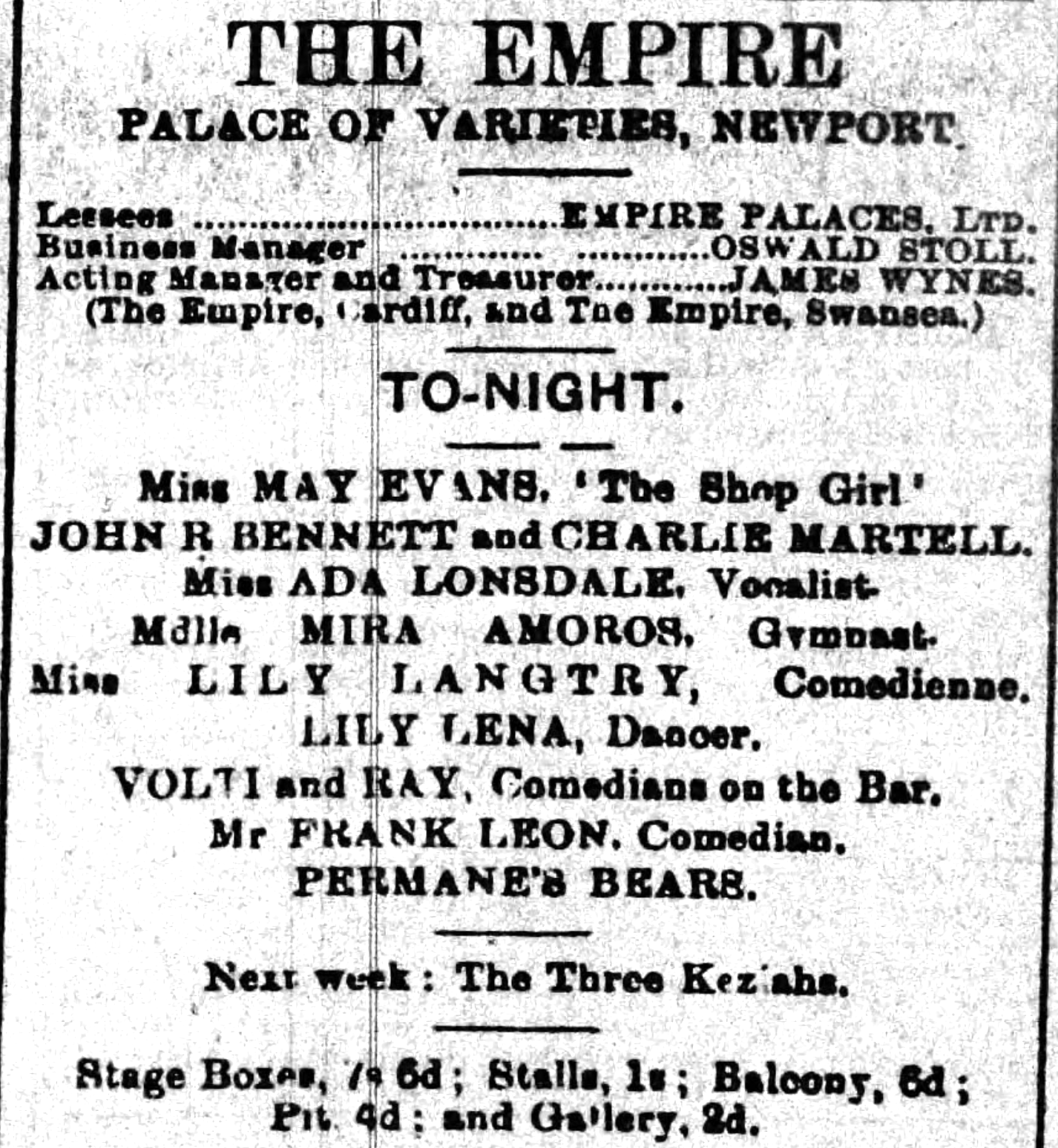
At the bottom of the billing were 'Permane's Bears' who travelled with their owner William Permane in a variety of European countries.
Wiliam Permane, (1864-1939), the equestrian son of a gymnast, stood in for a bear-trainer while travelling with a circus in Russia, and then turned his hand to training bears himself. His bears, usually three female Siberian bears, performed in Sweden and Spain before coming to Covent Garden in London in 1889/90 when ‘people were astounded to see bears standing on their heads, walking a narrow pole, barrel rolling, riding a tricycle and even seated at a table, enjoying a meal. Two of the bears were named Wodki and Sasuski’ (Turner, 1995). The Cambridge audience were amused by the clever if ungainly antics of the three bears who apparently drank beer and rolled logs. For more on Permane’s Bears and animal cruelty see Circus Animals. [Source: William Tudor's Circus]


The George Hotel’s Bowling Green
1905 appears to have been the year when bowls was becoming popular with greens appearing at places like Belle Vue and Newport Athletic Ground. There was also one ‘adjoining‘ the George Hotel in Maindee as shown in the advert below.

There doesn’t seem to be many places where the green could have been if as described in the advert it was adjoining the pub. The logical location would have been the area of ground at the beginning of Victoria Avenue behind the pub. So far I haven’t been able to find out any information beyond the advert.


A Diver in Court
Sarah Bayles was charged with stealing George Allen's watch and guard. —The girl was defended by Mr. Champ —The prosecutor is a diver, who goes down in a diving bell in the channel, to pick up a cargo of iron. On Saturday night he had got drunk, by diving too often into mug, and having strolled up the canal side, he dived into the water of the canal for some purpose unexplained — perhaps in search of rail iron; or it might have been the watch and guard, which, in a guarded moment just previously, when he kept watch on his property, had been all safe but at some subsequent period had vanishes — when or how, he knew not; nor could he now enlighten the Bench but he knew he was with a girl in some house, and the watch and guard now produced by Grist, were his.
P.C. Grist said he saw the diver and the prisoner walking along the canal side together. He warned the girl off; but she said she was going to see her "home," as he was drunk. Presently, the officer heard a, splash in the water, and running down, he found the diver emerging from the water; the girl standing on the bank. Grist pulled him out, when he said he had been robbed of watch, guard, and money, by the girl, but she denied knowledge of it. P.C. Pratten took the watch from the girl. The prisoner was committed for trial at the session.
— Monmouthshire Merlin, Saturday 26th May, 1854
Stealing Wearing Apparel
Mary Mahoney was committed to fourteen days for having stolen three jackets, dresses, and other articles, the property of Joseph Ewins, of High-street.

— Monmouthshire Merlin, Saturday 20th October, 1871
Juvenile "Pickers and Stealers"
Cornelius Sullivan and John McCarthy, two urchins of a tender age, were charged with being vagrants. —H.P. Waters proved finding the boys carrying sacks on the wharfs, looking out for plunder. The Mayor severely admonished the fathers of the boys, and reminded them 0f their guilt, in not preventing their children from crime. — Mr. Rennie said he should like to send the fathers to prison, instead of their boys. The Superintendent said the boy McCarthy had been to prison, and flogged.—The bots were discharged, with a caution.
— Monmouthshire Merlin, Saturday 26th May, 1854
A Rough Gang of Fellows
A rough gang of fellows, chiefly from Friars’ Fields, or that neighbourhood, were charged with a breach of the peace, two of them having fought a battle which lasted forty minutes, and the others having aided and assisted, on the east bank of the river, last Sunday forenoon, during divine service. — Mr Champ appeared to defend one of the pugilists, who had been drawn into a fight, through having prevented his antagonist from forcing his way into a meeting of Mr Bailey’s supporters, held recently. The parties were bound over to keep the peace for three months, in £20 each, and ordered to pay 8s costs each.
— Monmouthshire Merlin, Friday 19th March, 1852
A Highway Robbery: A Schoolmaster Abroad
James Gaminon, hawker, Catharine Lake and Ellen Bryant, women of abandoned character were charged with stealing 7s. 6d. and a French coin from the person of Thomas Edward Turberville, on the public highway.
Prosecutor is a school-master, residing in East-street. On Wednesday, at about midnight, he left a public house, in which he had been drinking in company with the prisoners; and after proceeding along a short distance, Gaminon caught him by the arms, which he held fast, while Lake took from his left hand pocket his money, amounting to three half-crowns and some coppers.
He was the worse for drink at the time but had a perfect recollection of what transpired, in proof of which he said, "I had a French piece amongst the money pocket." The French coin described was produced by P.C. Samways. The prosecutor was unable to follow the prisoners, and being overpowered by drink, lay down on the pavement. Mr. Kessick thought the “Schoolmaster was abroad” on that night (laughter.)
Mr. Henry Groves, professor of music, said, at about ten minutes before twelve on Wednesday night, he left the house of Mr. Gould on the Goldtops, and proceeded down towards the South Wales Railway station. When opposite the lane leading to Mr. Cordes's factory, he saw two men on the other side, one lying against the wall and the other, who he identified as the prisoner Gaminon leaning against him. It was moonlight, and there was a lamp near. The women were standing about a yard from the two men. As witness passed, he heard one of the men say, “Go with the women you sha'nt, go home.”
Witness went aside, and in a short time saw the male prisoner with the other man down; one of the women then went close to them, when he (witness) went towards them, and they all three moved off and across the bridge over the South Wales Railway. Witness ran round by Thomas-street into High-street, and at Mr. Compton’s shop met the prisoners, who were talking about the money'; they then crossed the street, and went into the Carpenters' Arms lane. He walked on by the Tredegar Arms, when he met with a policeman, whom he directed to follow the prisoners, while he went round by Market-street to intercept them. At the bottom of the lane he met them, called to the officer and gave them into custody.
Witness then went back to Pentonville, where he found the prosecutor lying on the ground. He asked what was the matter? and the answer was, I'm drunk, and I have been robbed of three half-crowns." PC Samways received information concerning the prisoners from the last witness, and took them into custody. On searching them at the station, he found on the person of Gaminon four half-crowns, and a sixpence in silver and about sixpence in copper, also a French coin identified by the prosecutor. Bryant pleaded not guilty. Gaminon and Lake pleaded guilty, and were sentenced each to six months imprisonment with hard labour. Bryant was cautioned and discharged.
Mr. Groves was then called by the bench who highly complimented his conduct in bringing the offenders to justice. Mr. Groves briefly replied that he had but performed an act of duty; on 3s. 6d. being tendered him for attendance, he declined to accept it, requesting that it might be placed in the poor box.
— The Cardiff Times, Saturday 2nd October, 1858
“It Was Proved She Was A Disgusting Beast”
Thomas Jones, a horse and pig dealer, was charged with committing a nuisance in one of the carriages on the South Wales Railway, also with travelling without a ticket. There was another charge of assaulting Stephens, a policeman of the South Wales Company. The charge of assault was first proceeded with, and admitted by the defendant, who said he did not kick the policeman until he (the policeman) had struck him on the eye. The defendant's eye bore evidenee of a severe blow.
The second charge of travelling without a ticket was proved by the ticket collector at the Newport station, and in answer the defendant said he did so by mistake.
The third charge of a most disgusting nature was proved by the guard, who said there was a woman in the same carriage who was beastly drunk. She left the train at Newport, and from the statement of a sailor, who was passenger in the same carriage but in another compartment, it was proved that she was a disgusting beast. The Major said the Bench had no power to deal with the charge of nuisance in the railway carriage, which was most disgusting, but they inflicted a fine of 40s. and 10s. costs for the assault, and 40s. with 19s costs for the second offence. The money was paid.
— The Cardiff Times, Saturday 2nd October, 1858

Pic-nic at Goldcliff
An open air entertainment for the benefit of the Organ Fund, Goldcliff church, came off in a field near the tump at Goldcliff, on Friday and was numerously attended. About 250 persons, many of whom were from Newport were present, and, favoured with lovely weather, enjoyed themselves most satisfactorily. A large marquee pitched on the ground served as a refreshment room for those who chose to avail themselves of it, but taking advantage of the fine day the majority pic-nicked under the blue canopy of heaven, and enjoyed the warmth of the solar rays with the fine breeze to fan their faces. The day was spent in entire enjoyment.
— The Cardiff Times, Saturday 2nd October, 1858


’What Should Be Done With The Russian Gun?
Mr. Lyne asked the Board what would be done with the Russian gun now lying in the Cattle Market, which he considered reflected discredit on the town. The gun was given to them as a trophy in remembrance of the gallant deeds of their brave soldiers, and should have a place assigned it worthy of the spirit in which it was presented.
Its present position was an insult to the brave men who had fought their battles, and a reproach to the council. Had the gun been presented to a village it would have received a more fitting attention, but here it had been thrown into the Market-place to lie and rust.
He thought more respect was due to their gallant soldiers, whose indomitable courage had taken it from their enemies. He was not present at the last meeting, but he had read the reports, and he would now propose that a committee be formed for the purpose of adopting such measures as should find the gun a suitable carriage and site.
Mr. Homfray had seen a similar gun at Carnarvon mounted on a carriage which, from its construction, attracted his attention. Since the last meeting he had written and received a letter respecting it, and from it he found that the cost of the carriage was £16.
The Mayor said, at the last meeting he undertook to put himself in communication with the agent of Sir Charles Morgan relative to a site in Park-place for the gun that he had not yet done so was no fault of his, for he had not been able to obtain the requisite interview. He then read the letter from Carnarvon, on which Mr. Lyne observed that that letter did not alter his proposed resolution,and moved that a committee, to consist of the Mayor, Alderman Homfray, Mr. James Brown, and Mr. G. W. Jones, be formed to determine on a proper site and carriage for the gun.
The Mayor thought its site had been agreed upon at the last meeting.
Mr. Townsend differed in opinion from the Mayor. He was present at the last meeting and did not understand that any definite site had been agreed on.
Mr. Lyne put his motion in due form, “that a committee, consisting of the Mayor, Ex-Mayor, Messrs Homfray, Brown and Jones, be appointed to recommend a suitable site, also to provide for the expense of a carriage for the gun.”
The resolution was seconded by Mr. Jones and carried, when the clerk was directed to write to the War Office requesting a plan of the gun carriage supplied from the Arsenal at Woolwich to the town of Carnarvon.
A conversation then took place, in which Mr.Townsend proposed as a proper site for the gun the space opposite the Westgate, which caused some jocular remarks respecting the service it would render, if mounted there, supposing that a second chartist riot should happen, in which case it could be pointed up Stow Hill to advantage.
Mr. Graham rose to deprecate these discussions, which, without leading to any benefit, took up much of their time. There had been already far too much time expended on the question of the Russian gun, when the real business of the town should have been attended to.
— The Cardiff Times, Saturday 2nd October, 1858

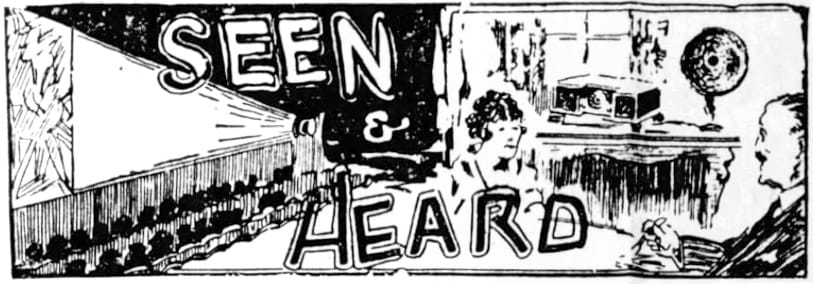
Corporation Mud
Corporation Road ratepayers — and their name is legion — will hear with satisfaction that there is a likelihood of this much-frequented thoroughfare being paved in the near future — the sooner the better. The paths during the wet weather are almost ankle deep in mud, which is very plentiful on the eastern side of the river. Some residents have long been promised the privilege of a pavement, and these will welcome the news that at last their hopes will be realised. Either the Corporation or private owners are responsible for the delay in carrying out a necessary public improvement.
— South Wales Argus, Saturday 1st January, 1898 (Subscription Required)
'A Woman and her Improvised Concert Hall'
Confinement in the Workhouse was too much for a widow names Catherine Ryan, whose features are well-known to those who attend the Newport Police Court. She was so elated at her freedom that she drank a deep, deep draught from the intoxicating cup. The drink made her so merry that she gave vent to her feelings in song, choosing a doorway in Commercial Road as an improvised concert hall. Her audience were so numerous as to cause an obstruction. A constable abruptly terminated the programme and marched off the woman to the police cells. On Friday morning she made her 34th appearance at the court and was amerced in the drunkard's penalty.
— South Wales Argus, Saturday 1st January, 1898 (Subscription Required)
'A Complaint About Begging'
At the risk of offending all the "good" people in Newport I enter my most strenuous protest against the encouragement of begging, which is given in churches, chapels and religious institutions. The number of "cards" which are in circulation, and the number of children who are calling at people's houses touting for subscriptions for this, that, and the other cause, is something appalling. To my mind, the system is calculated to have an extremely bad effect upon children. It teaches them to thrust themselves forward (not infrequently their persistence amounts to impertinence), it undermines the spirit of self-respect and self-reliance, and it tends to develop priggishness. If there is a cause to be aided, let the children exercise the spirit of self-denial and give them own coppers; if they with to enlist sympathy, let them do it in their own circle, not thrust themselves upon strangers. This indiscriminate begging is good neither for them nor for the persons approached.
— South Wales Argus, Saturday 22nd January 1898 (Subscription Required)
'Not All Skittles and Beer'
The Mayor of Newport is finding out that it is not all beer and skittles to hold the office. He says it seems that if anybody has a dead donkey, or is in trouble, or has the bailiffs in the house, they seem to think that it is the proper thing to apply to the Mayor. As an instance of the varied duties which fall to a Mayor's lot he told the subscribers of the Workmen's Infirmary Fund that one morning he was in the police cells interviewing a female prisoner who wanted him to pay her fine, and the same afternoon he was escorting a titled lady to the platform at a public function.
— South Wales Argus, Saturday 22nd January 1898 (Subscription Required)

Bicycle Accident in Newport — Minister Seriously Injured
A serious bicycle collision occurred on Newport Bridge on Friday evening, about seven o'clock, when the Rev T.F. Rawlings, who for some time has been the superintendent minister of the Newport Wesleyan Circuit, was cycling in the direction of Maindee. At the present time, workmen are engaged in laying the feeder cables for the new electric tramways. At each end of the bridge the ground has been excavated, and wooden boards have been placed round the holes in which the workmen are busy with pick and shovel.
These erections, which are in the centre of the roadway have the effect of decreasing the available room, only the tramlines on each side being left, and consequently there is great congestion of traffic, the road, of late, having been frequently blocked. However necessary these erection may be — (upon this point we do not, for the moment, express an opinion) — undoubtedly they are a source of unceasing annoyance and of constant danger. It was so in the present instance.
Mr Rawlings was passing the wooden structure on the east side of the bridge, another rider was coming in the same direction, and an eye-witness of the accident states that when the cyclists became parallel, the unknown cyclist gave a slight turn, with the result that a collision was inevitable. The wheel touched the rev. gentleman's machine and threw him violently to the ground, and when assistance came to him it was found that he had been seriously injured.
The rev. gentleman was placed in a cab and taken to his residence in Stow Park Avenue. On his way there a call was made at the house of Dr Macormack, who fortunately was at home and accompanied Mr Rawlings to his house. An examination resulted in the discovery that in addition to various minor injuries in the nature of bruises, etc, the right leg of the rev. gentleman had been fractured by the violent fall. This was set by Dr Macormack, and the minor injuries received attention.
On making inquiries this morning, we find that Mr Rawlings had again been visited by Dr Macormack, who informed our reporter that the patient had passed a restless night and had suffered great pain. The injured limb was very much swollen. Great and general sympathy will be felt with the patient.
— South Wales Argus, Saturday 6th September, 1902 (Subscription Required)

Newport and Pillgwenlly Water Works Company: Purity of the Water
The Chairman then intimated that the formal business of the meeting was concluded, but there was one matter which he wished to mention, that was in reference to the report of the medical officer of the Board of Health.
No doubt they had seen it, but he nevertheless would read it:—"The present may serve as an opportune period for calling your attention to the unsatisfactory state of the water supplied to the town by our public company, for though there may be nothing in it positively injurious to health, yet there can be no doubt it contains too much organic impurity. If the water is kept in bottles and exposed to the light for two or three days it smells and becomes offensive. This is an unfailing test of the presence of an amount of organic matter that ought not to exist in drinking water."
—Now that was a rather grave charge coming from the medical officer of the Board of Health and the directors had accordingly taken the earliest opportunity of testing the water in the very way which Dr. Davies himself suggested. He (the chairman) should also state that the directors had received from the Town Clerk a formal letter calling their attention to the report of the medical officer. In order to test the water in the way suggested by Dr. Davies the directors had obtained water in open bottles, and exposed it as they might observe to the light and sun. The water had been obtained from six different parts of the town three from the lower part of Pillgwenlly, and three from other places. The water thus obtained had been lying exposed since Thursday last, which would be three clear days; and there it was for their inspection (producing a bottle), as clear and pure, and as free from sediment as it was almost possible for it to be. Such a charge as he had read having been made, he might say at this the first opportunity he had of doing so that it was the unanimous desire of the directors of the Water Works Company that the Board of Health should be invited to make similar tests either by themselves or their officers, according to the mode suggested by Dr. Davies, and a very simple test it was that the water should be obtained and placed in that room in their charge, and the directors hoped they would be enabled to satisfy the Board of Health that the water was as pure as it was possible to be.
Mr. W. S. Cartwright, following up the remarks of the Chairman, said he might mention that the directors had with the greatest possible anxiety entered upon the question, because they felt that the supply of pure water to the town was of vital importance, and they felt it their duty to satisfy themselves that the water was as pure as possible. They had adopted the test suggested by Dr. Davies, with water obtained from different parts of the town, and they could come to no other conclusion than that the water was perfectly pure. There might be other tests to apply, but he thought the directors would adopt a proper course in inviting the Board of Health, by their inspectors or medical officer, to apply similar tests, in order that they might be satisfied. It so happened that on the day after the report of the medical officer was published, he met Mr. Lyne, who had been attending a meeting of a commission appointed by the Crown to inquire into the pollution of rivers. The commission comprised Sir William Rawlinson and two other gentlemen well qualified for their task. They had invited Mr. Lyne to give them his assistance in this neighbourhood, and he accordingly attended them. Among other things they expressed a wish to see the Water Works, and they had gone over the Water Works, and Sir William Rawlinson having tasted the water, pronounced it wholesome and good. This was satisfactory to his (Mr. Cartwright's) mind, although Sir William Rawlinson did not adopt any scientific test; yet the impression made upon his mind was favourable as to the quality of the water. He (Mr. Cartwright) could not help thinking that there was some error in the test as applied by Dr. Davies. Not that he wished to impute to him anything wrong, but the test must certainly have been made under unfavourable circumstances. They (the directors) had made the test, and found the water in every one of the bottles perfectly pure. Some years back, he had been reminded that the water had been examined by an analytical chemist, and was then pronounced to be a remarkably pure and good water.
The Chairman added, that about a month ago the directors visited the whole of the works, and were much gratified at the extremely good state in which they found the works, and were satisfied that the water was as pure and free as it could be. He was never more surprised than when he read the report of Dr. Davies. He (the Chairman) thought that the test of the medical officer must have been made under very exceptional circumstances. The company obtained their water out of the tile stones, one of the very best sources and they traced it from point to point, and they were satisfied that water could not be supplied more pure.
Mr. Cartwright remarked that the water works were now kept most private, and no one was allowed to go there. A complimentary vote of thanks to the Chairman, moved by Mr. W. S. Cartwright, and seconded by Mr. W. Evans, was agreed to, and the meeting then terminated.
The samples of water spoken of above were then submitted to the reporters present, who were unable to detect either by taste or smell anything in the slightest degree objectionable. A very small amount of sediment was noticed in one or two bottles, excepting which the water was unusually clear. Some pump water tested in the same way compared somewhat unfavourably.
—Monmouthshire Merlin, Saturday 1st September, 1866

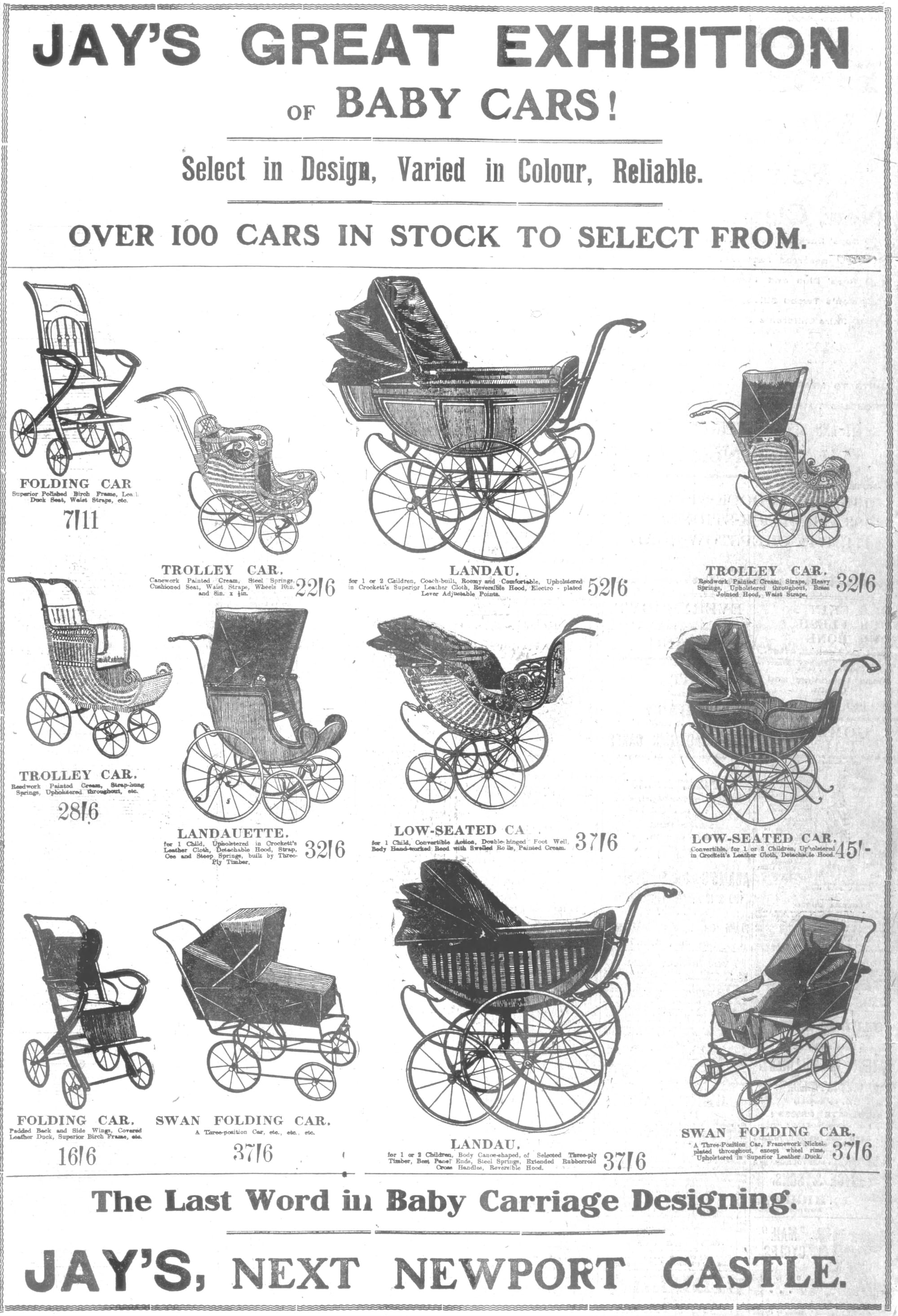


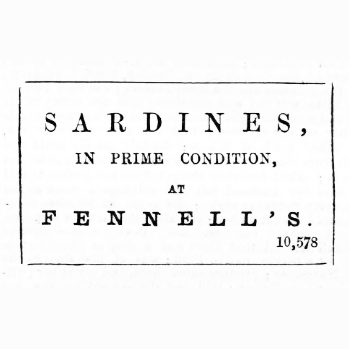
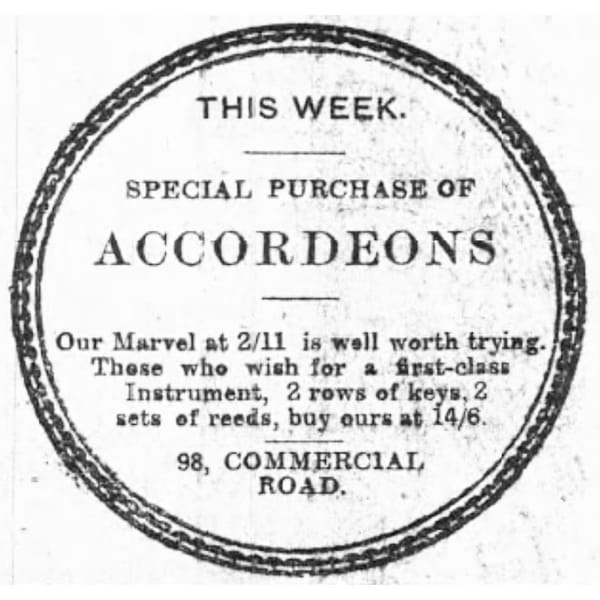
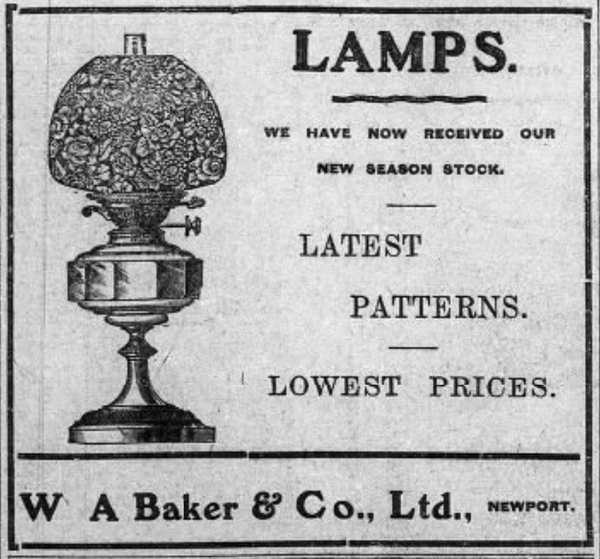
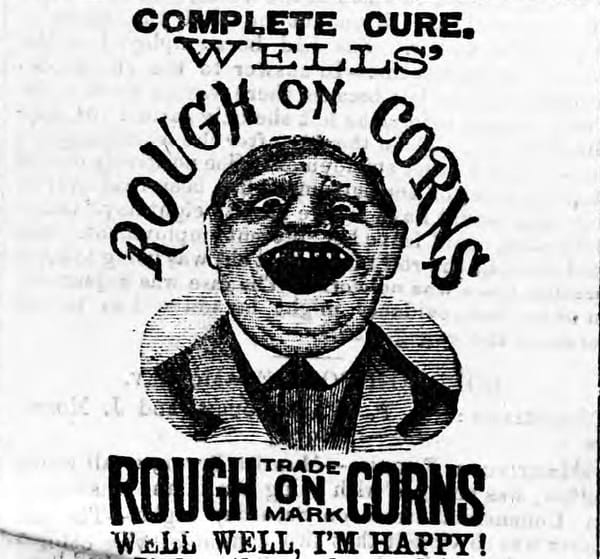
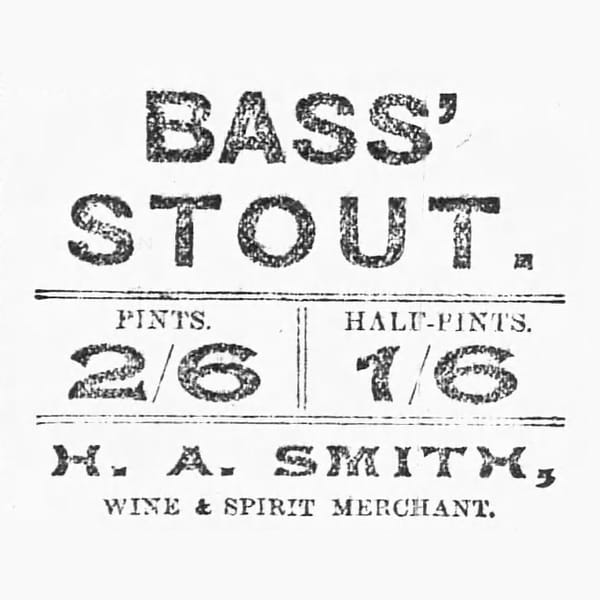
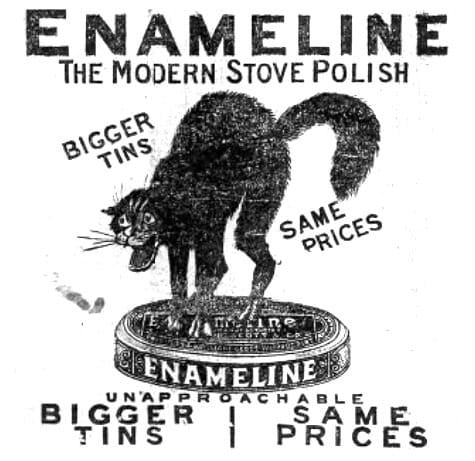
Member discussion